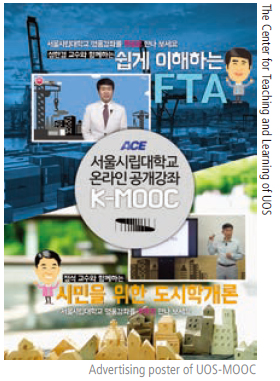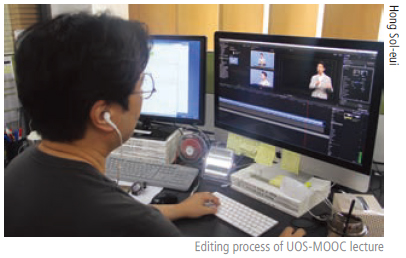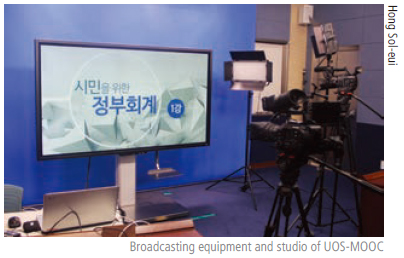The Center for Teaching and Learning (CTL) at the University of Seoul (UOS) is planning to expand their online lectures this fall by adding four more courses on K-MOOC (Korean Massive Open Online Courses). This May, the government selected UOS as one of 10 leading universities on K-MOOC, an online service that provides lectures on various academic subjects to students and citizens.

Upon entering the site, university students and general citizens can freely choose where and when to listen to the lectures regardless of their registration status or region. Currently, more than 300 lectures from 20-some universities have been uploaded to the K-MOOC site (http://www.kmooc.kr/). The current Moon Jae-in administration also chose the expansion of K-MOOC as one of their prime state affairs and is planning to use K-MOOC to create more prosperous opportunities in higher education. UOS initially offered two lectures for the spring semester and will be expanding to six this fall.
UOS first opened two K-MOOC lectures in the fall semester of 2016 and spring semester of 2017. “An Easy Understanding of the FTA” by Sung Han-kyung, a professor in the School of Economics, opened in 2016, and “Urbanology: An Introduction for Citizens” by Jung Seok, a professor in the Department of Urban Planning and Design, were opened in 2017. As it was selected as one of the leading universities on K-MOOC, UOS is planning to upload two more MOOC lectures, helping to usher in the Fourth Industrial Revolution. “Positive and Negative Accounts for Citizens” by Choi Won-seok, a professor in the Department of Science in Taxation, and “The Story of the Semiconductor” by Shin Chang-hwan, a professor in the School of Electrical and Computer Engineering will open in the fall semester of 2017. Additionally, “Heritage of the Korean (Goryeo) Dynasty” by Lee Ik-joo, a professor in the Department of Korean History, and “What is the democracy?” by Lim Dong-gyun, a professor in the Department of Urban Sociology, will be uploaded next semester, with partial support from the ACE business. All four of these lectures will be open to both UOS students and citizens.

Thanks to both the old ACE Business and its selection as a leading K-MOOC provider, UOS-MOOC not only received extra financial support, but also more recognition from students and professors and a stronger willingness to cooperate, according to the Lee Sun-young, research professor at the Office of Educational Innovation. “However,” she said, “UOS also tried and will try to solve problems like a lack of interaction between instructors and students with open lectures like ‘Meeting with the Instructor’ or field trips to famous historical sites. By combining a MOOC lecture with an offline lecture, every student in and out of campus who signed up was invited and could have the chance to interact with the actual instructor,” she added.

According to an interview with Lee, UOS will be adding six more lectures next year and already signed a memorandum of understanding (MOU) with the Seoul Human Resource Development Center to develop UOS-MOOC lectures for the education of public officials. She believed that UOS-MOOC also has great potential, especially in fields related to urban studies or taxation. She hopes more students will become interested in the lectures and urged them to participate. To develop a more curious student body and improve its benefits, UOS is also deeply considering how UOS-MOOC lectures could be developed for point recognition.
By Shin Jeong-ho, Hong Sol-eui

